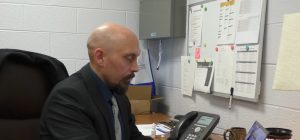High Schools see success in mental health programs
< < Back toATHENS, Ohio (WOUB) – High school officials say compared to previous years, they are seeing less mental health cases as the year progresses. Yet the overall number of referrals are still high.
Mental health referrals have increased since the years of the pandemic as students try to reacclimate themselves into schools.

Over the summer Athens High School added a third counselor to its staff which, according to Springer, shortened the response time.
Springer said having a third counselor has helped take the load off of staff and parents because there is someone on hand all the time when a situation arises.
The school also has provided spaces in the school for Hopewell counselors to make access easier for students dealing with mental health crises.
“Having a mental health provider in house that is able to see their clients and also provide assistance to us as needed, especially when we are in crisis mode, has been beneficial,” Springer said.
However, Springer said there is always a need for more counselors.
“For every one student that is receiving the help, there is another that is not,” he said.
In his state of the state address, Gov. Mike DeWine made it an emphasis to focus on mental health by providing more funding to districts and working to expand the counseling workforce.
However, despite the governor’s efforts to help address concerns, there are still challenges surrounding lack of personnel in the area.
“Providing money to schools is great, don’t get me wrong,” Springer said.
He went on to say since there is a lack of personnel in the area to hire, the money will not be of much help.
Schools Promoting Communication
Athens High School administrators have also implemented outreach from peers. This past December, about 80 upper classmen had a conversation with Wyatt Cooper, an alum whose brother died of an overdose.
Cooper was joined by three other college-aged individuals who all took questions from the students surrounding serious topics surrounding mental health.
What was supposed to be just an hour “went into two hours because it was just the reality of use, abuse, unhealthy coping, body image and self-esteem, and people related to that extremely well,” Springer said. “The amount of feedback students gave me was unbelievable.”
Not only was the conversation well received by students, but the faculty and staff in attendance as well.
“It’s a really important piece of the puzzle that I feel is really tricky to reach students at a level that they really understand and can relate to,” Heidi Shaw, a nurse at Athens Middle School, who attended the discussion. “So that conversation, I’m so eternally grateful that it happened.”

The positive responses encouraged Springer to keep that conversation going so his staff can better help address mental health concerns, including unhealthy coping through drug use.
“This problem is not going away and having a better educated staff is going to help,” he said.
Other schools are implementing their own programs to address mental health concerns.
Over at Eastern High School, administrators implemented a student assistance planning program that involves a committee that gathers to talk about students who get referrals from parents and teachers and address their needs.
The SAP program was first started in the elementary school last year and proved to be successful, which led administrators to add it to the high school because of the increase in mental health issues among students.
The committee draws on all the resources it has – such as school counselors and Hopewell counselors – to help the kids.
According to SAP coordinators Gaynelle Layne and Sheryl Roush, the committee has been successful, and they expect it to continue to grow.
Principal Garret Hall wants to create an environment of open and honest communication.
“It’s our job as children advocates. And that’s anybody in the education profession,” Hall said. “I don’t care if you’re a cook, a custodian, whoever, it is your job to always try to maintain a positive environment and build relationships.”
Moving forward, administrators are looking to the state’s updated health standards to help them create programs to fulfill the new requirements.
The standards state that beginning July of this year, school districts have to include health education of evidence-based instruction for students in grades 6-12 on suicide awareness and prevention, violence prevention and social inclusion.
The teachings must last at least one hour or a standard class period and will continue annually once implemented.

